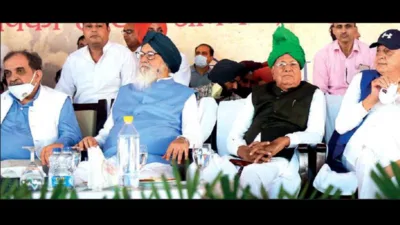O.P. Chautala, the five-time Chief Minister of Haryana and prominent figure in Jat politics, has been a significant force in the state’s political landscape. Born on January 1, 1935, in Chautala village, Sirsa district, he took over the leadership of the Indian National Lok Dal (INLD) from his father, late Chaudhary Devi Lal, who was also a key political figure and former Deputy Prime Minister of India. Chautala successfully served as Chief Minister in his stints from 1999 to 2000, and again from 2005 to 2007, where his focus on agricultural reforms and development strategies was evident. His political career not only witnessed the flourishing of Jat identity politics but also showcased the versatility and adaptability in his leadership style. Throughout his tenure, Chautala faced challenges including legal battles and allegations of corruption, including a sentence related to a recruitment scam that led to a prison term until 2019. Chautala’s political strategies involved alliances and partnerships, notably with Shiromani Akali Dal leaders like Parkash Singh Badal, with whom he had shared a complex yet enduring political relationship marked by cooperation and rivalry. O.P. Chautala has inspired many and remains a respected yet controversial figure among the Jat community, symbolizing resilience within Haryana’s socio-political fabric. Amidst modern political shifts, his legacy continues to influence upcoming leaders and shapes the discourse around regional and caste-based politics in India. As the Jat community continues to play a critical role in the state’s political evolution, Chautala’s name is often referenced in discussions around Jat reservations and the community’s significance in Indian politics. His enduring presence remains pivotal in Haryana’s political narratives, and he remains active in the political arena, shaping the future of the region’s governance and community relations.
O.P. Chautala: The Strongman Who Shaped Jat Politics in Haryana













